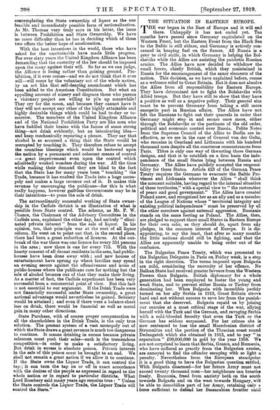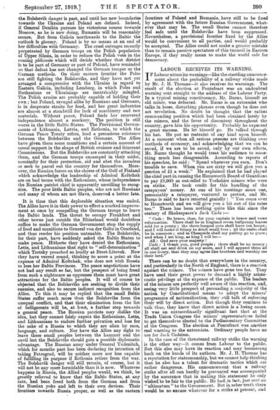THE SITUATION IN EASTERN EUROPE.
THE war began in the East of Europe and it will end there. Unhappily it has not ended yet. Ten months have passed since Germany capitulated on the Western Front, but the Eastern Front from the Black Sea to the Baltic is still ablaze, and Germany is actively con- cerned-in heaping fuel on the flames. All Russia is a prey to civil strife, in which Germany is helping the Bol- sheviks while the Allies are assisting the patriotic Russian armies. The Allies have now decided to withdraw the small forces, chiefly British, which they maintained in Russia for the encouragement of the saner elements of the nation. This decision, as we have explained before, comes as a welcome relief to Great Britain. But it does not absolve the Allies from all responsibility for Eastern Europe. They have determined not to fight the Bolsheviks with Allied troops. But they have still to show that they have a positive as well as a negative policy. Their general aim must be to prevent Germany from taking a still more energetic part in Russian affairs. The Allies have not left the Russians to fight out their quarrels in order that Germany might step in and secure once more, either through the Bolsheviks or the partisans of the old order, political and economic control over Russia. Polite Notes from the Supreme Council of the Allies to Berlin are in- effective, as we see in the case of General von der Goltz, who remains in Courland and Lithuania with his hundred thousand men despite all the courteous remonstrances from Paris. Thbre is only one way of thwarting these German designs, and that is to establish on a firm basis the inde- pendence of the small States lying between Russia and Germany. The Allies have publicly accepted the responsi- bility for these States. Article 433 of the German Peace Treaty requires the Germans to evacuate the Baltic Pro- vinces and Lithuania whenever the Allies " shall think the moment suitable, having regard to the internal situation of these territories," with a special view to " the restoration of peace and good government." The Allies have created Poland anew, and recognized her as an ally and as a member of the League of Nations whose " territorial integrity and existing political independence " must be preserved by all the other members against external aggression. Rumania stands on the same footing as Poland. The Allies, then, are pledged to support these small States in Eastern Europe for their own sake, as they should do, apart from any pledges, in the common interest of Europe. It is dis- appointing, to say the least, that after so many months the little nations should still be fighting, and that the Allies are apparently unable to bring order out of the confusion.
The Bulgarian Peace Treaty, which was presented to the Bulgarian Delegates in Paris on Friday week, is a step in the right direction. The terms imposed upon Bulgaria are mild, considering the enormity of her offence. No Balkan State had received greater favours from the Western Powers than Bulgaria. British diplomacy for a whole generation had been employed to foster the young and weak State, and to prevent either Russia or Turkey from dominating her. When Bulgaria with incredible perfidy turned on her ally Serbia in 1913, Great Britain strove hard and not without success to save her from the punish- ment that she deserved. Bulgaria repaid us by joining our enemies at a most critical stage of the war, allying herself with the Turk and the German, and ravaging Serbia with a cold-blooded ferocity that even the Turk or the German has seldom surpassed. For her crimes she is now sentenced to lose the small Macedonian district of Strumnitza and the portion of the Thracian coast round Dedeagatch which she obtained in 1913, and to .pay " in reparation " 190,000,000 in gold by the year 195&. We are not surprised to learn that Serbia, Greece, and Rumania, who have suffered so greatly from the Bulgarian armies, are annoyed to find the offender escaping with so light a penalty. Nevertheless from the European standpoint it is a good thing to have the Bulgarian question settled. With Bulgaria disarmed—for her future Army must snot exceed twenty thousand men—her neighbours can breathe freely. Rumania, freed from anxiety both on the south towards Bulgaria and on the west towards Hungary, will be able to demobilize part of her Army, retaining only a force sufficient to defend her Beasarabian frontier until the Bolshevik danger is past, and until her new boundaries towards the Ukraine and Poland are defined. Indeed, if General Denikin pursues his victorious course towards Moscow, as he is now doing, Rumania will be reasonably secure. But from Galicia northwards to the Baltic the outlook is gloomy. Poland is by no means at an end of her difficulties with Germany. The cruel outrages recently perpetrated by German troops on the Polish population of Upper Silesia, in order to reduce the Polish vote in the coming plebiscite which will decide whether that district is to be part of Germany or part of Poland, have reminded us that defeat has not changed the German temper or the German methods. On their eastern frontier the Poles are still fighting the Bolsheviks, and they have not yet arranged a compromise with the Ukraine in regard to Eastern Galicia, including Lemberg, in which Poles and Ruthenians or Ukrainians are inextricably mingled. The Polish armies are probably capable of holding their own ; but Poland, ravaged alike by Russians and Germans, is in desperate straits for food, and her great industries are almost at a standstill for lack of machinery and raw materials. Without peace, Poland finds her recovered independence almost a mockery. The position is still worse in the little Baltic States. The Provisional Govern- ments of Lithuania, Latvia, and Esthonia, to which the German Peace Treaty refers, lead a precarious existence between the Bolsheviks and the Germans. The Allies have given them some munitions and a certain amount of moral support in the shape of British cruisers and itinerant Commissions. But the Bolsheviks are constantly attacking them, and the German troops encamped in their midst, nominally for their protection, aid and abet the invaders or seek to parcel out the country for themselves. More- over, the Russian forces on the shores of the Gulf of Finland which acknowledge the leadership of Admiral Koltchak are on bad terms with the Esthonians, whose independence the Russian patriot chief is apparently unwilling to recog- nize. The poor little Baltic peoples, who are not Russians and many of whom are not Slays, deserved a better fate.
It is time that this deplorable situation was ended. The Allies have it in their power to effect a marked improve- ment at once by compelling the German troops to leave the Baltic lands. The threat to occupy Frankfort and other towns just outside the Rhineland would doubtless suffice to make the German Government stop the supply of food and munitions to General von der Goltz in Courland, and thus render his position untenable. The Bolsheviks, for their part, have suddenly asked the Baltic States to make peace. Hitherto they have denied the Esthonians, Letts, and Lithuanians that right to " self-determination " which Trotsky preached -so loudly at Brest-Litovsk. Now they have veered round, thinking to score a point at the expense of Admiral Koltehak, who does not wish Russia to lose her Baltic Provinces. The peace negotiations have not had any result so far, but the prospect of being freed from such a nightmare as-oppresses them must have great attractions for the Baltic peoples. It will of course be objected that the Bolsheviks are seeking to divide their enemies, and also to secure indirect recognition from the Allies. To this it may be replied that the small Baltic States suffer much more than the Bolsheviks from the unequal conflict, and that their elimination from the list of belligerents will be, at least, a further step towards a general peace. The Russian patriots may dislike the idea, but they cannot fairly expect the Esthonians, Letts, and Lithuanians to endure further privation and loss for the sake of a Russia to which they are alien by race, language, and culture. Nor have the Allies any right to leave these small peoples between the hammer and the anvil lest the Bolsheviks should gain a possible diplomatic advantage. The Russian army under General Yudenitch, which for months past has been declaring its intention of taking Petrograd, will be neither more nor less capable of fulfilling its purpose if Esthonia retires from the war. The Bolshevik danger will still remain, of course, but it will not be any more formidable than it is now. Whatever happens in Russia, the Allied peoples would, we think, be greatly relieved to know that the Baltic States, at any rate, had been freed both from the German and from the Russian yoke and left to their own devices. Their frontiers towards Russia proper, as well as the eastern frontiers of Poland and Rumania, have still to be fixed by agreement with the future Russian Government, what- ever that may be. The small States cannot therefore feel safe until the Bolsheviks have been suppressed. Nevertheless, a provisional frontier fixed by the Allies would be convenient to all parties, and would probably be accepted. The Allies could not make a greater mistake than to remain passive spectators of this turmoil in Eastern Europe, if they really mean to make the world safe for democracy.



































 Previous page
Previous page